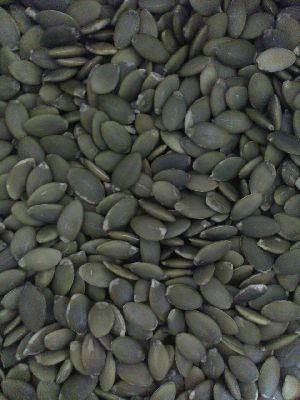
Dried Pumpkin Seeds
925 Per Kilogram
5 Kilogram (MOQ)
Pumpkin seeds (pepita) are edible kernels of fruit pumpkin. The seeds, in-fact, are concentrated sources of many health-benefiting vitamins, minerals, anti-oxidants, and essential amino-acids such as tryptophan, and glutamate. Nutritional facts health benefits are filled with lots of minerals including phosphorus, magnesium, manganese, iron and copper. Are a good source of vitamin k. Contain phytosterols, compounds that that have been shown to reduce levels of ldl cholesterol. Contain l-tryptophan, which helps with good sleep and lowering depression. Tryptophan is converted into serotonin and niacin. Serotonin is also very helpful in helping us to have a good night�s sleep. Are high in zinc, making them a natural protector against osteoporosis. Low intake of zinc is linked to higher rates of osteoporosis. In a study of almost 400 men (age from 45-92) published in the american journal of clinical nutrition they found a correlation between low dietary intake of zinc, low blood levels of the trace mineral and osteoporosis at the hip and spine. Are a good source vitamin e; they contain about 35.10 mg of tocopherol per 100 g. Are the most alkaline-forming seed. Are an excellent source of vitamin b group (thiamin, riboflavin, niacin, pantothenic acid, vitamin b-6 (pyridoxine) and folates). Contain good quality protein. 100 g seeds provide 30 g. According to studies, pumpkin seeds prevent calcium oxalate kidney stone formation. Reduce inflammation for arthritis without the side effects of anti-inflammatory drugs. Are used in many cultures as a natural treatment for tapeworms and other parasites. Are good for prostate health! the oil in pumpkin seeds alleviates difficult urination that happens with an enlarged prostate.

Pumpkin seeds Raw
Get Price Quote
20 Kilogram (MOQ)
pumpkin seeds are available in roated also. It can be used as mouth freshner. Pumpkin seed is a nutritious food with a high oil (50% w/w) and protein (35%) content that varies depending on cultivar (fruhwirth and hermetter 2007). Palmitic (≤ 15%), stearic (≤ 8%), oleic (≤ 47%), and linoleic (≤ 61%) fatty acids are the main components of the oil (bavec et al. 2007), while albumins and globulins make up approximately 60% of the crude protein.
Best Deals from Pumpkin Seeds